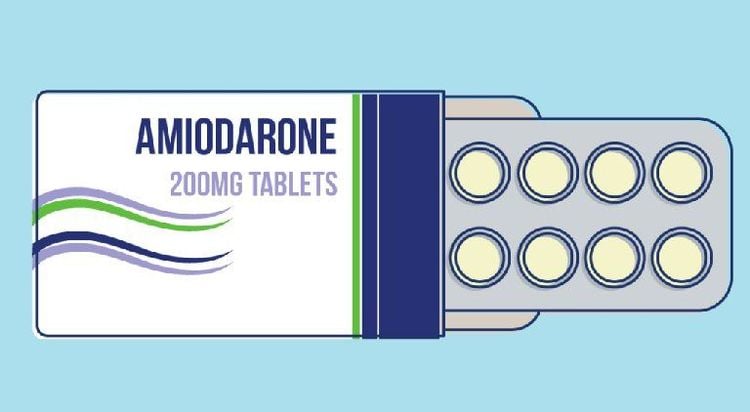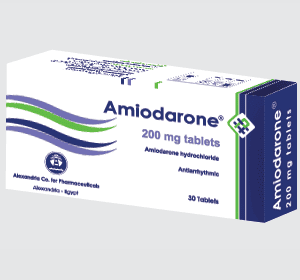This is an automatically translated article.
Article by Pharmacist Bui Thi Thanh Ha - Clinical Pharmacist - Faculty of Pharmacy - Vinmec Times City International Hospital
Amiodarone is an antiarrhythmic drug prescribed by the treating physician. The drug can cause some unwanted side effects, so the patient should strictly follow the instructions, avoid stopping the drug without consulting the doctor.
1. What is amiodarone? Uses of the drug amiodarone Amiodarone is an antiarrhythmic drug that is an iodine derivative. This is a prescription drug and should only be used with a doctor's prescription. You should not self-medicate in any case without being examined, evaluated and prescribed by a specialist.
You may be prescribed oral amiodarone in the following cases:
Atrial fibrillation: Your doctor may prescribe amiodarone to prevent recurrence of new atrial fibrillation, restore a normal heart rhythm (sinus rhythm) , treatment before catheter ablation of atrial fibrillation to increase the success rate of the procedure or to prevent atrial fibrillation after cardiovascular surgery. Ventricular Arrhythmias: Physicians may prescribe amiodarone for the treatment of ventricular arrhythmias or for the prevention of sudden death from ventricular arrhythmias, including in combination post-defibrillator placement. Before using the drug, your doctor will advise you about the disease, benefits and risks of short-term and long-term use of the drug. You need to understand those basics to self-monitor and talk to your doctor during routine visits.

2. Situations in which amiodarone should not be used Some cases of amiodarone avoidance such as a history of hypersensitivity to amiodarone or iodine, a diagnosis of sinus node insufficiency, second- and third-degree AV block, syncope due to bradycardia unless a pacemaker is in place), cardiogenic shock, thyroid dysfunction, hepatitis, interstitial lung abnormalities.
3. Common side effects of amiodarone Some side effects that can be encountered when using amiodarone are as follows:
The drug can cause a drop in blood pressure: Tell your doctor if you have this problem. Change position slowly to avoid dizziness, be careful when going up and down stairs during the first time taking the drug. When using the drug, your skin may be easily sunburned and sunburned. Therefore, should avoid sun exposure, sunbathing and should use sunscreen, protective clothing when going out. The drug may cause diarrhea or constipation, nausea, vomiting, loss of appetite. If you have a lot of diarrhea or vomiting, you need to tell your doctor, to avoid dehydration and electrolytes. Although rare, the drug can cause visual disturbances, decreased vision. In this case, you need to tell your doctor right away. The drug can cause liver toxicity, lung toxicity, heart rhythm disturbances, thyroid dysfunction (hypothyroidism or hyperthyroidism), or mental effects. terrible. In addition, if you are over 65 years old, the drug may cause more side effects than younger people. You should talk to your doctor when you experience any discomfort or abnormality during the use of the drug for timely monitoring and advice.

4. Notes when using amiodarone To increase effectiveness and reduce the risk of side effects, during use, you need to pay attention:
You need to discuss with your doctor your medical history and medical history. allergies before taking the medicine You should talk to your doctor about all the medications you are taking before using amiodarone and any medications added during your treatment. Amiodarone can interact with many drugs (eg HIV drugs, quinolone antibiotics, anticoagulants...) to affect the effectiveness of the treatment drugs or increase the risk of side effects. of drugs. Do not change the dose on your own, stop taking it on your own, or take any other medications, including over-the-counter medicines. Drugs are cumulative and long-acting, and drug interactions may occur late or even after amiodarone has been discontinued. You need to take the correct dose as prescribed, and have regular check-ups. Sometimes, your doctor may change your dose to accommodate a changing medical condition. You need to talk to your doctor about being pregnant or breastfeeding. Amiodarone can cross the placental barrier and adversely affect the fetus. Reported adverse reactions in neonates of mothers receiving amiodarone include cardiac arrhythmias such as bradycardia, QT prolongation, ventricular extrasystoles, neonatal hypothyroidism (with or without goiter), hyperthyroidism thyroid gland, neurodevelopmental abnormalities dependent on thyroid function, fetal growth retardation and/or preterm birth. However, in some special cases, amiodarone still needs to be prescribed to pregnant women when the arrhythmia is severe, unresponsive to other drugs or other therapeutic agents are contraindicated. In case of exposure during pregnancy, the neonate should be monitored for thyroid dysfunction and cardiac arrhythmia for timely treatment.
Amiodarone and its active metabolite are regulated in breast milk. It was reported that breastfed infants receiving amiodarone had bradycardia and hypothyroidism. Therefore, breastfeeding should be avoided while taking the drug. Because the drug is long-acting, it may still be present in breast milk for several weeks after the mother has stopped taking it. If the mother is taking amiodarone but still wishes to breastfeed, some literature suggests that thyroid function and serum amiodarone levels should be monitored in the nursing infant.
Amiodarone is an antiarrhythmic drug. To use the drug effectively and avoid unwanted side effects, patients need to strictly follow the instructions of the doctor or pharmacist.
Please dial HOTLINE for more information or register for an appointment HERE. Download MyVinmec app to make appointments faster and to manage your bookings easily.














